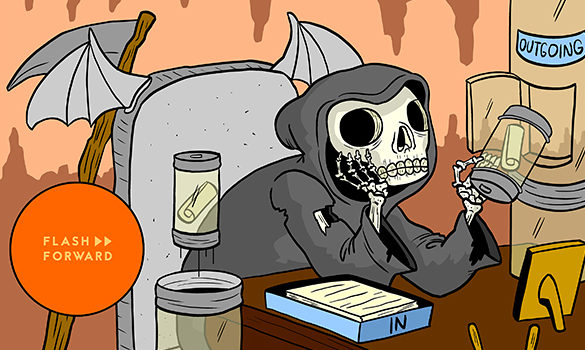Terror Management Theory is one of the most talked-about and controversial theories in psychology. It was first proposed by social psychologist, Ernest Becker in his book, The Denial of Death, in 1973. The theory has since been developed and refined by several other researchers.
The theory has been extensively researched and has garnered a great deal of attention from scholars worldwide. In this blog post, we will explore what TMT is, its key concepts, how it has developed over the years, and the various ways it has been studied. We will also hear from experts in the field about their thoughts on TMT.
Contents
Understanding Terror Management Theory
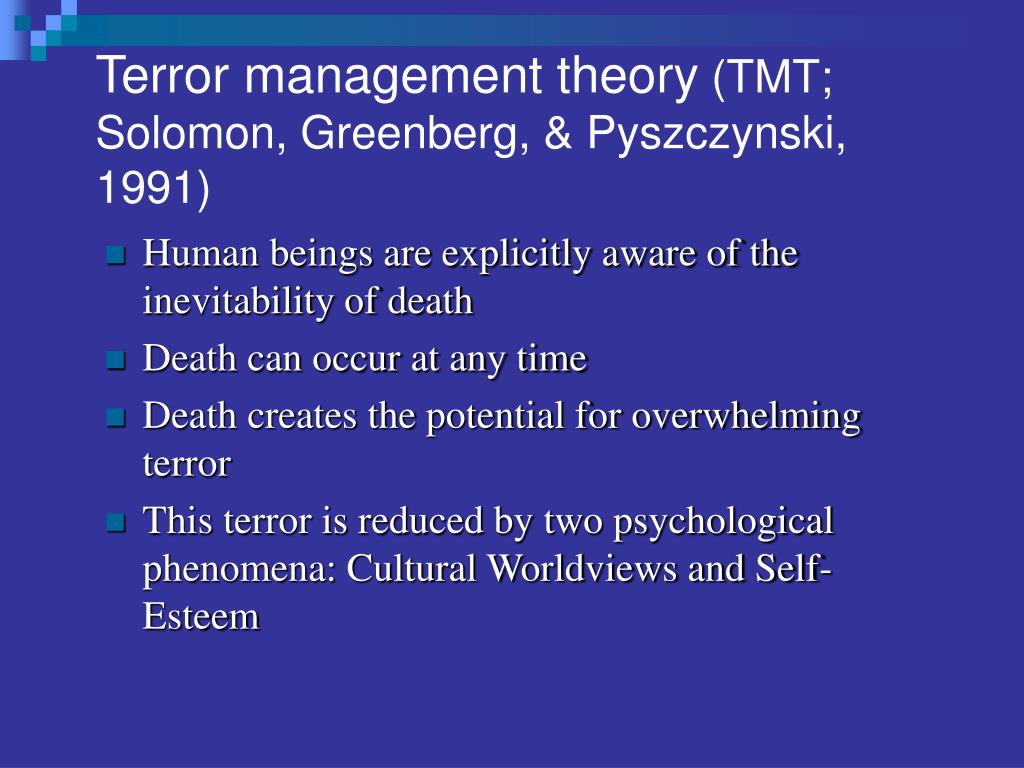
Terror Management Theory (TMT) is a social psychological theory that examines how humans deal with the awareness of their mortality. The theory was first proposed by Jeff Greenberg, Sheldon Solomon, and Tom Pyszczynski in 1987.
The fear of death is a universal human experience, and TMT posits that all humans grapple with the awareness of their mortality in one way or another. TMT examines how people manage this fear and what benefits may result from doing so.
Significance of TMT
TMT has been influential in several different areas, including social psychology, existential psychology, and the study of mortality. The theory has helped to shed light on how people deal with the fear of death and the implications of this fear.
Since its inception, TMT has been extensively researched and has yielded several findings regarding how humans cope with the fear of death. Some of these findings include; people who/:
- are more aware of their mortality tend to cling more strongly to their beliefs and values.
- have a strong sense of self-identity tend to be less afraid of death.
- are dying often fear death less than those who are not facing imminent death.
- believing that one’s life has purpose or meaning can help to buffer the fear of death.
- people tend to cope with mortality by seeking out comfort in close relationships, engaging in religious or spiritual activities, and participating in other life-affirming behaviors.
History, And Development
The origins of TMT can be traced back to the work of Ernest Becker, who was the first to propose the theory in his book, The Denial of Death, in 1973.
Becker’s work focused on the idea that humans are motivated to find a way to cope with the awareness of their mortality. He argued that people employ several different defense mechanisms to deal with the fear of death.
Becker’s work was influential in the development of TMT, and many of the key concepts found in TMT were first introduced by Becker.
Since its inception, TMT has undergone development and refinement by several different researchers. The theory has been studied in a variety of different ways and has yielded a wealth of information about how humans deal with the fear of death.
Unfolding Terror Management Theory
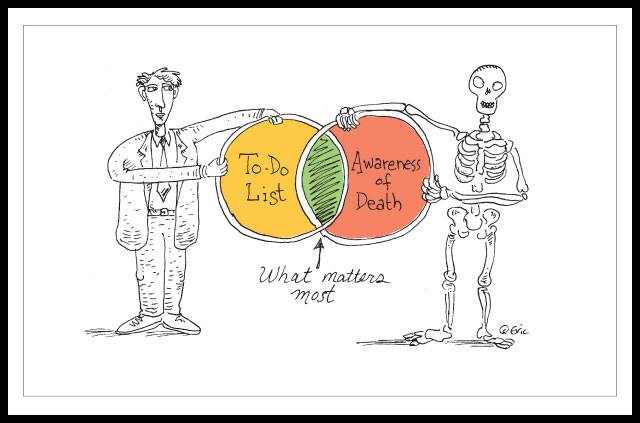
The fear of death is a universal human experience, and TMT posits that all humans grapple with the awareness of their mortality in one way or another. TMT examines how people manage this fear and what benefits may result from doing so.
One of how TMT has been studied is by looking at how the fear of death manifests itself in different areas of life. For example, TMT has looked at how the fear of death influences:
- political views.
- the way people view their mortality.
- the way people respond to terrorism.
- cultural activities, such as fashion and music.
- the way people view others around them, including celebrities.
Do People Cope With Mortality
One of the key questions that TMT seeks to answer is whether or not people can cope with the fear of death. The theory has yielded several findings that suggest people do manage the fear of death in several different ways. People who:
- have a strong sense of self-identity and purpose tend to be less afraid of death.
- are more aware of their mortality tend to cling more strongly to their beliefs and values.
- often cope with mortality by seeking out comfort in close relationships, engaging in religious or spiritual activities, and participating in other life-affirming behaviors.
Benefits of Terror Management
There are several different benefits that may result from managing the fear of death. Some of these include, people may/:
- feel more connected to others.
- have a stronger sense of self-identity.
- have a greater sense of purpose in life.
- feel more resilient in the face of stress and adversity.
Do People Who Are Dying Fear Death More or Less
One of the areas that TMT has looked at is how people who are facing imminent death respond to the fear of death. Some research has found that those who are dying often fear death less than those who are not facing imminent death.
This may be because those who are dying have a more concrete sense of their mortality and know that they will soon be facing death. As a result, they may be less preoccupied with the fear of death.
Implications of Fear of Death
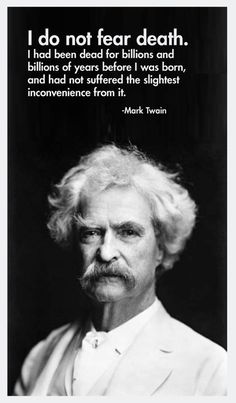
The fear of death can have several different ramifications for people’s lives. Some of these include, people may/:
- become more conservative in their political views as a way to bolster their sense of self-identity and mortality salience.
- avoid engaging in certain activities, such as risky behaviors, out of fear of death.
- become preoccupied with their mortality and spend a lot of time thinking about death.
- the way people interact with others may change as a result of the fear of death.
NOTE: Fear can also be a motivating factor for terrorist activity.
Can TMT Affect Political Views
TMT has been used to explore how the fear of death can influence people’s political views. According to research, when people are made aware of their mortality, they may become more conservative in their political views. They do it as a way to bolster their sense of self-identity and security.
Does TMT Influence Celebrity Culture
Celebrity culture has become increasingly commonplace in our society. TMT may help to explain why some people are drawn to celebrities and why celebrities hold such a powerful fascination for many people. Some research has found that people who are high in self-esteem tend to be more attracted to celebrities than those who are low in self-esteem.
Does Terrorism Inspire Fear of Death
Terrorism is a major concern in the world today, and it is natural for people to feel fear in the wake of terrorist attacks. TMT may help to explain why some people respond to terrorism with more fear than others. Some research has found that exposure to terrorism can lead to an increase in the fear of death.
Evaluating Terror Management Theory
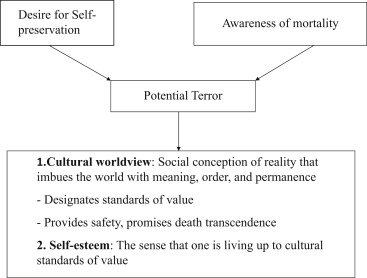
There is a great deal of research on TMT and it is still an evolving theory. As such, it is difficult to make a definitive evaluation of the theory at this time. However, the theory has a great deal of potential and warrants further exploration.
Validity of TMT
The validity of TMT has been extensively examined and it is a credible theory. The theory has withstood the test of time and continues to be influential in the field of social psychology.
Relevance of TMT
Despite the criticisms, TMT remains a highly relevant and influential theory. The theory has helped to shed light on several important aspects of human behavior, and it continues to be a major topic of research. Also, TMT is relevant to a wide range of different areas, including social psychology, existential psychology, and the study of mortality.
Criticisms, And Limitations
TMT has been subjected to a great deal of scrutiny, and there is still much that is unknown about the theory. Some of the criticisms of TMT include:
- the theory is overly complex and difficult to understand.
- theory may be based on faulty assumptions about human behavior.
- lack of empirical evidence to support the claims made by the theory.
- use of the questionable methodology in some studies conducted on TMT.
Hearing From Experts
To gain a more well-rounded understanding of TMT, it is helpful to hear from experts in the field. Some of the experts who have written about or studied TMT include:
- Jeff Greenberg
- Roy Baumeister
- Shane O’Connor
Resources
There are several resources available on TMT, including books, articles, and websites. Some good places to start include:
- The Terror Management Theory Website: This website provides a comprehensive overview of TMT, as well as links to a variety of articles and resources.
- The Oxford Handbook of Terror Management Theory: This book provides a comprehensive overview of TMT, written by some of the leading experts in the field.
- Terror Management Theory: This article provides a good introduction to TMT, including a discussion of its history, development, and key concepts.
Conclusion
Terror Management Theory is a well-developed theory that has been supported by a great deal of research. The theory is valid in several different areas and is relevant to a variety of different disciplines.
However, the theory is not without its criticisms and limitations. TMT offers a unique perspective on the fear of death and human behavior and is worth further exploration. Thank you for reading!
A Word From Therapy Mantra
Your mental health — Your psychological, emotional, and social well-being — has an impact on every aspect of your life. Positive mental health essentially allows you to effectively deal with life’s everyday challenges.
At TherapyMantra, we have a team of therapists who provide affordable online therapy to assist you with issues such as depression, anxiety, stress, workplace Issues, addiction, relationship, OCD, LGBTQ, and PTSD. You can book a free therapy or download our free Android or iOS app.
